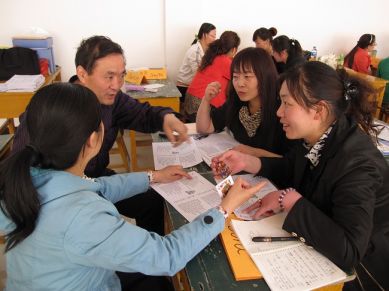Missionaries to China Discuss Church Contributions to Society, English Education Gap

Churches in China are key contributors to Chinese society through various programs and are participating in closing the nation's rural-urban gap in English language education, missionaries to the country working in partnership with a local Christian group say.
Tom and Lynne Morse, missionaries who have taught English in rural and urban areas in China, also issued observations about the contribution of Churches to society in the country in a visit on Thursday to the Cleveland headquarters of the United Church of Christ, according to UCC News.
"Churches play key roles in Chinese society, the Morses said, with AIDS awareness programs, housing development improvements and hospice care," according to the report.
"In some instances, churches in the countryside have as many members –– up to 5,000 in some congregations –– as churches in Beijing and Shanghai," the report states.
The Morses are missionaries with Global Ministries, a joint ministry of Christian Church (Disciples of Christ) and the United Church of Christ. As missionaries, they worked through an Amity Foundation partnership with Global Ministries.
The Foundation is an independent Chinese voluntary organization created on the initiative of Chinese Christians to promote education, social services, health and rural development from China's coastal provinces in the east to the minority areas of the west.
The Morses initially taught in southern rural China near Vietnam and later moved north Chengdu, to the north and Nanjing to the east.
Tom told UCC News that while English is required in primary schools, most rural schools lacked trained teachers. He says students who don't score well on English in the country's entrance exam aren't admitted to college, growing a rift between urban and rural education.
He said he taught mostly college-level students who would return to their villages to teach English at those schools in the hopes of closing a gap between urban and rural education.
They say they hope to continue their missionary work with Global Ministries in the Pacific region after completing a master's program in Norway.
A survey published in 2009 by Peking University shows that there is an increasingly large gap between the education levels of people holding urban and rural permanent residency permits, according to Xinhua news.
The survey, carried out in Beijing, Shanghai and southern Guangdong Province found 0.7 percent of 2,732 rural respondents have university degrees or hired compared with 13.6 percent among the 3,253 urbanites polled.
The Xinhua report notes a rural residency permit – or "hukou – mostly means low income, and poor social welfare coverage.
In a separate, 2011 report of the urban-rural cultural gap in China, Zhen Xiaxing, a National People's Congress deputy from southwest China's Sichuan province and director of the Sichuan provincial department of culture said there is a "huge disparity" between China's urban and rural cultural development.
"The rural cultural infrastructure is getting better year after year," he said. "But the lack of high-quality grassroots cultural workers has become a bottleneck restricting the rural cultural development," he said.
He suggested attracting more college graduates to be engaged in grassroots cultural work.
"China's grassroots cultural construction needs more workers willing to commit to the economically backward countryside, but such people are too few now," he said.